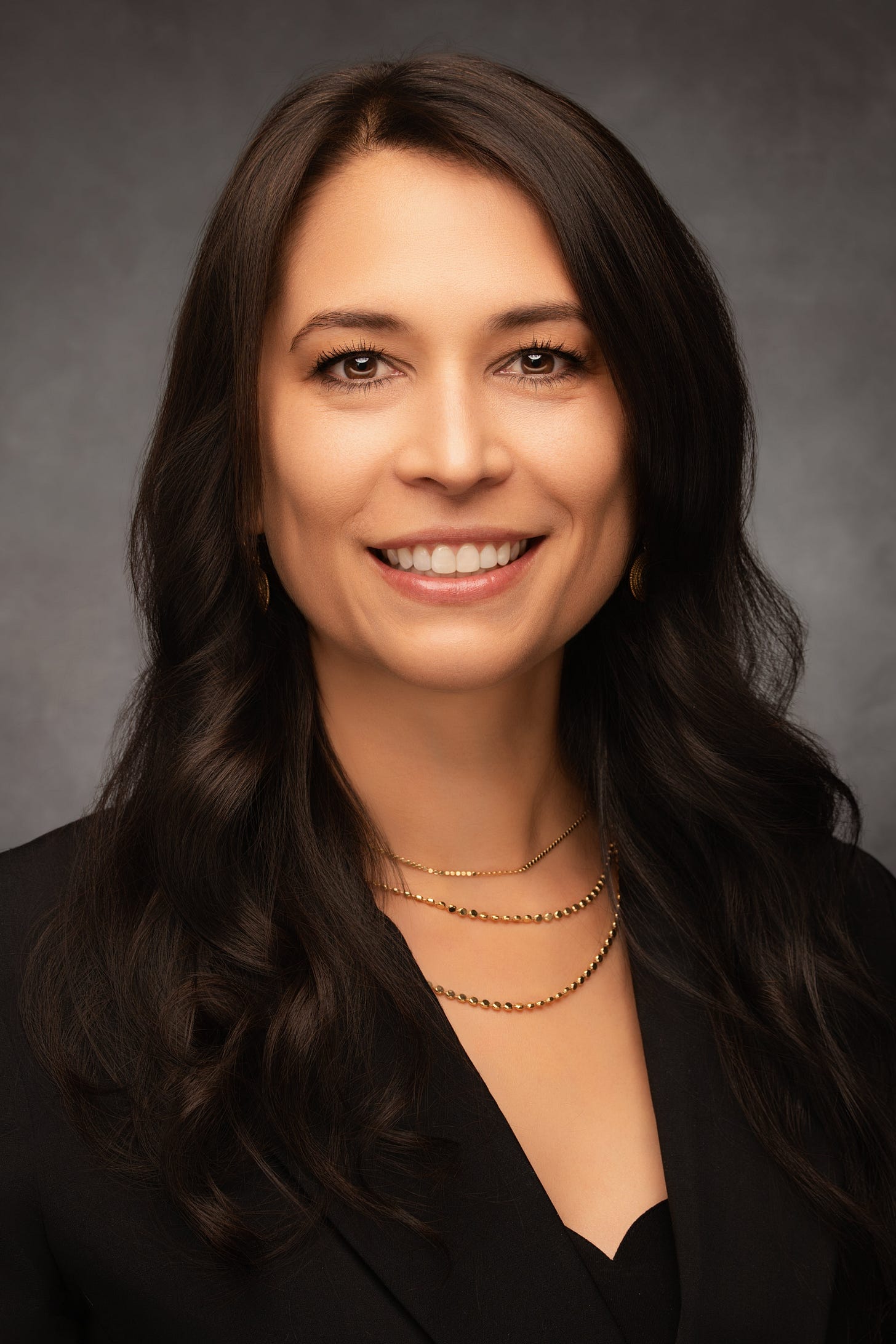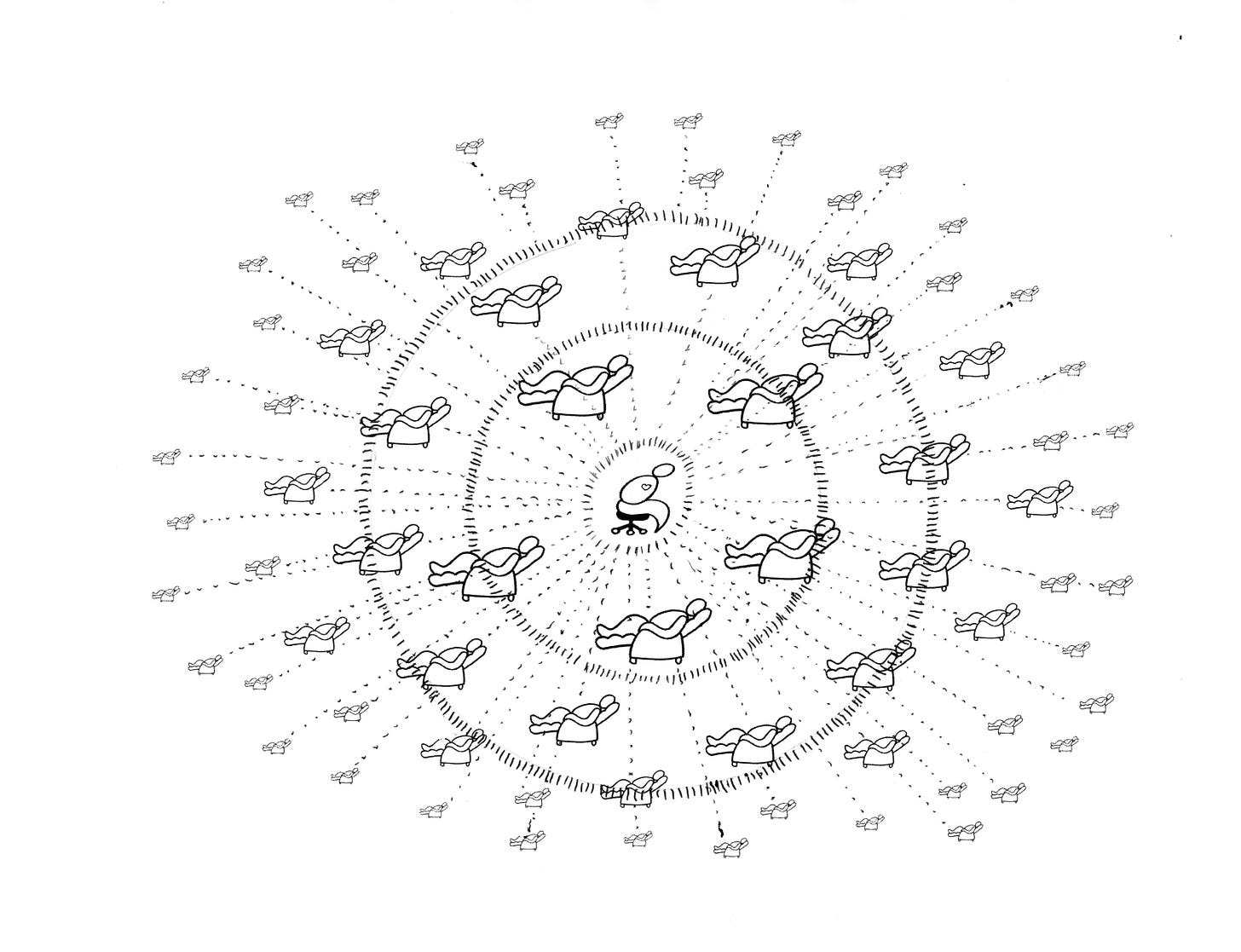On 5NP, Inclusion, and Holding Space
an interview with Nicole Krishnaswami, JD, Executive Director of the Oregon Medical Board
I think it’s clear from earlier posts, but just in case I’ll repeat: making 5NP accessible to the people in Oregon who need it most is going to require building organizational partnerships. We’ve been working on that project from various angles from the beginning of our 5NP trajectory. What I didn’t expect when we started out was that one of our organizational partnerships would be with the Oregon Medical Board, the state regulator for acupuncturists.
Regulation (and deregulation) is a recurring topic for this newsletter. If you’re new here you might want to take a look at How Can You Control It When It’s Already in the Hot Pot, On Regulation and Deregulation, and Acupuncture without the Acupuncture Profession Part One. I’ve been thinking about this for years; at this point I’m convinced that neither regulation nor deregulation automatically creates access to acupuncture for people who need it. The culture around regulation is different state by state — which you can see if you look at 5NP regulations (or the lack thereof) — but no matter where you are, access has to be built. Partnerships are the most efficient way.
Nicole Krishnaswami has served as the Executive Director for the Oregon Medical Board since 2018. She’s been giving thoughtful attention to 5NP, including offering expert guidance on its legislative path, since Representative Nosse first reached out to her in December 2023 about the logistics of a possible 5NP law. I’m grateful to her for making time to do an interview.
But before we get into our conversation, I want to take a quick detour and tell you a story about an experience I had with acupuncture regulators back in 2018 — because for me at least, it’s important context. I’ve previously thought about sharing it here but I didn’t. Because it’s bananas. Anyway, I think now’s the right moment but please take a deep breath — I’m going to tell you about the time that some acupuncturists tried to use the regulatory process to keep POCA Tech graduates from practicing in an entire state. (Not Oregon.)
Here’s what happened: POCA Tech doesn’t teach Chinese herbs, which means our graduates can’t get licensed in states that require the NCCAOM herbal credential. As a result of some acupuncture profession politics (basically a variation on “community acupuncture isn’t real acupuncture”), the Utah state acupuncture association tried to get Utah’s Department of Professional Licensing (DOPL) to add the herbal credential as a requirement specifically to shut POCA Tech grads out of Utah.1 At the time, we had three Utah students enrolled in our program who were planning to practice in Utah. And so I scurried to Salt Lake City in February 2018 (in a snowstorm) to attend a hearing that was initiated by acupuncturists trying to weaponize the regulatory process against community acupuncture in Utah as well as our tiny school. The truly bananas part was that the NCCAOM, the national credentialing body for acupuncture, jumped in to help them.2
Lucky for us, their plan hit a roadblock in the form of sanity, integrity and due process, thanks to Larry Marx the Bureau Manager of DOPL. (Who is not, obviously, an acupuncturist.) He was unmoved by the shenanigans of the state association and the NCCAOM; he was clear that the proposed rule change amendment was aimed at POCA Tech — and he wasn’t having any of it. At the same time, he was so calm, grounded and gracious with everyone, I was amazed. He said, “After listening to the information that’s been provided, and the information I’ve received from numerous people on both sides, at this time I do not believe that the Division feels that changing this rule is appropriate, so I’m not going to move the rule forward. That’s within my discretion, and within the Division’s discretion by statute.”
That hearing was a circus, but even while I was preoccupied with various acupuncturists saying outrageous things, I was also taking notes on how well Larry Marx was managing it. I learned how to be an administrator mostly by watching other people; I didn’t go to school for it and it definitely doesn’t run in my family. Watching Larry Marx was an education. I thought “Oh so that’s how it’s done!” He was so patient, even-handed and unflappable. He listened to everybody. I thought, “Oh, so that’s good regulation.” If I hadn’t seen it, I don’t know if I would have believed in it: regulators who don’t take anybody’s side because they’re fundamentally on the side of the process itself. That kind of regulation made it possible for POCA Tech to continue to train acupuncturists to practice in Utah.
Talking with Nicole about the OMB’s process of regulating 5NP made me think of Larry Marx. Here’s the conversation we had:
Nicole: At the Board’s quarterly meeting in July, we were talking about 5NP along with a number of other bills that passed during the 2025 legislative session that affect our work. The consensus was that 5NP is the biggest lift on the shortest timeline. 5NP is a big deal for us: We haven’t added a category of newly regulated providers for 50 years — the last time we did was when we added acupuncturists in 1973.3
Me: Well, that certainly puts this in perspective.
Nicole: So I’d like to set the expectation that we’re not experts at this.
Me: On our end, I feel the same way; this is a big learning curve for everyone. I mean, how could we be experts at something we get to practice so rarely? (Note to POCA Tech students: getting the opportunity to do anything truly new, like 5NP in Oregon, requires being willing to not be an expert. See also, Art & Fear.)
Nicole: We’re going to do our very best to get 5NP regulations right the first time, but it will probably need to be an iterative process, and we will depend on a continuous feedback loop from the community about what is working and what needs to be improved. So many things have come up already, so many little details, that we hadn’t considered before. In truth, we don’t yet know what 5NP will ultimately look like in Oregon. But we are committed to a transparent regulatory process and including the right people in the process.
Me: When Will Miller and I first met with you last summer, you mentioned your philosophy of inclusion. Tell me about that?
Nicole: It’s a little like the super hero thing, right? “With great power comes great responsibility.” I’ve been given the privilege of being in a position of power, it’s my job to make sure other people have a voice. My passion is amplifying diverse voices; many people traditionally haven’t had a voice in these processes, and that needs to change. Everyone should be heard and have an opportunity to participate in the process.
In our staff meetings, I have some ground rules: everyone’s respected, everyone’s encouraged to contribute, and we give appropriate consideration and follow up to everyone’s contributions — and when we’re done, we speak with one voice. Ensuring everyone has a chance to participate in the process means we can all stand behind the outcome because we know the thoughtfulness and respect that led up to the collective decision.
Similarly, the Board’s priority in developing 5NP is inclusion and careful development of these regulations only after considering a diverse community of perspectives.
Me: On the website, you shared what has to happen in order to implement 5NP:
Implementation Timeline (Dates and times subject to change)
June 11, 2025: HB 2143 signed by Governor Tina Kotek
July 10, 2025: Oregon Medical Board will review and adopt an implementation plan.
August-September 2025: HB 2143 Workgroup meets
September 12, 2025: Acupuncture Advisory Committee reviews the Workgroup's recommendations and makes recommendations to the Oregon Medical Board
October 2, 2025: Oregon Medical Board reviews all recommendations
After October meeting: OMB files notice of proposed rules; formal public comment period opens
November 24, 2025, 5PM: Public comment period ends
December 5, 2025: Final review by the Acupuncture Advisory Committee
January 8, 2026: Final review and possible adoption by the Oregon Medical Board
January-March 2026: OMB staff develop systems for program (IT, website, forms, etc.)
March 1, 2026: Rules become effective
March 2, 2026 (Monday): OMB starts accepting 5NP technician applications
That’s a lot of administrative work, in a short period of time.
Nicole: The culture of our agency is that when we’re given a deadline, we push really hard to make that deadline — but I have to say this is a challenging one. We need to hold space for all the conversations related to 5NP, and we want to give appropriate consideration to everyone’s input and expertise. If meeting the deadline comes at the expense of hearing from the community, we will choose to delay implementation or take an incremental approach to 5NP implementation.
Me: At POCA Tech we talk a lot about holding space, and when you put it that way it really makes sense. We’re also all about inclusion, and we like the concept of holding space so much that one of our acupuncturists made a diagram of it. We refer to it as the nucleus diagram, with the acupunk in the center on their rolling stool surrounded by a little cloud of patients in recliners. That’s a good way for us to convey what it feels like to work a community acupuncture shift on any given day but it’s also a good metaphor for a community acupuncture practice as a whole. Our job is holding space for people — a wide diversity of people — in their healing process.
And so I can imagine that similarly, your job is to hold space for the regulatory process as a whole, which looks like a lot of people — a wide diversity of people — having necessary conversations and patiently working through the details. There’s a similar vibe of intentionality, neutrality and a kind of global goodwill, and it takes effort to hold that.
Nicole: Regulators are in a challenging position. We don’t want to create regulations that prevent people from doing the work; we don’t want to create unnecessary barriers. At the same time, we have a duty to the public to uphold standards so that when people access a service like 5NP, they get what they were expecting. So how do we execute our duty without over-regulating? We’re very aware of that. The dilemma is that if you’re regulating well, people think they don’t need you. But if something goes wrong, then people ask where were the regulators?
Me: There’s an analogous thing in community acupuncture — if we’re doing our jobs well, all there is to see is a room of people peacefully sleeping, quietly doing their own healing. But the work that it takes to maintain that environment, the systems and the processes, those are basically invisible to the people who are accessing the service. And the better you are at holding space, the more invisible your work is.
It’s amazing that we get to see the regulatory process unfold in this way; it’s kind of like a fairy tale where something invisible becomes visible. And I feel like we have the same goal — we want to lay the foundations for a long term relationship between 5NP in Oregon and the OMB that’s positive, constructive and transparent. And I realize we’ve just given the OMB a mountain of work so I really appreciate you taking the time to have this conversation.
Reminder to everyone about the 5NP Workgroup: it starts this Wednesday, August 13th, and it’s open to the public! See the OMB website for more details. If you want your voice to be heard, go to the meetings!
POCA Tech students, this is a once-in-a-lifetime educational opportunity, so I’ll see you there —right? :)
Workgroup Meeting Dates (via Zoom)
Wednesday, August 13, 4-7 p.m. | Agenda & Materials
Wednesday, August 27, 4-7 p.m.
Wednesday, Sept 3, 4-7 p.m.
5NP Workgroup meetings will be held online and open to the public, and all members of the public are invited to attend the meetings and participate during the designated public comment period. Interested parties may attend virtually at this link or by telephone at 1-669-254-5252 with the Meeting ID: 161 696 3336 and Passcode: 2087211297. For more information on attending 5NP Workgroup meetings or to request accommodations, contact Gretchen Kingham, Executive Assistant, gretchen.kingham@omb.oregon.gov or 971-673-2700.
Meeting materials will be posted prior to the meeting.
Elaine Wolf Komarow wrote about our adventure with regulation in Utah on her blog, The Acupuncture Observer:
One school that is concerned about student debt, accessibility, and the growth of the profession, asked ACAOM and NCCAOM to reconsider the hourly requirements for acupuncture education and sitting for the credentialing exams. There was no move to lower standards (read more here) or change competencies, only to use the same hourly requirements that served our teachers and most experienced practitioners so well.
ACAOM hasn’t responded to the proposal, and NCCAOM did not respond favorably (NCCAOM Response Ltr to POCA Board 11-9-17 Final with signatures.doc). But members of Utah’s Acupuncture Advisory Board and the Utah Association of Acupuncture and Oriental Medicine were so upset by POCA Tech’s request that they launched a preemptive strike, moving to require the NCCAOM herb credential of all practitioners, whether or not they want to use herbs…
The Advisory Board and the Utah Association, with the help of the NCCAOM, promoted the Board’s proposed changes. The letter (UtahNCCAOMletter) they distributed is inaccurate. For example, a growing number of states are not requiring the herbal exam of all practitioners, and acupuncture and Chinese Medicine have not always been inextricably linked…A letter written by a professional association, signed by the Chair of the Advisory Board, and distributed and supported by the NCCAOM (which would benefit financially from the change) raises significant ethical and good governance concerns.
Our adventure turned out fine in the end, thanks to a transparent regulatory process — and crucially, community acupuncture people in Utah who were paying attention to it. Three POCA Tech graduates are now licensed and practicing community acupuncture in Utah, serving lots and lots of patients, and another POCA Tech student is doing her internship at Wasatch Community Acupuncture with a plan to practice there in the future.
Actually maybe the most bananas thing was that the NCCAOM denied it later. Just saying — if people have had bad experiences in the past with bureaucracy, I get it.
See this fascinating account of the OMB’s history. (In 1895, one of the Board members was a homeopath!) Note that EMS providers were previously regulated at the local level and respiratory therapists were regulated at the facility level whereas acupuncture was an unregulated/illegal practice prior to 1973 — much like 5NP.





Thank you, Lisa, for writing about the regulatory process that comes after legislation has passed. It's a dry subject. You did a good job making it interesting. I am envious of how the Oregon Medical Board is bringing together a variety of stakeholders and taking all the different points of view under consideration. The process in New Hampshire was very different. The New Hampshire Acupuncture Board wrote the rules to a law they never wanted. They opposed the bill and when they realized it was a losing battle they asked for amendments that would make it hard to implement. After the law passed they worked hard to find ways to put restrictions in the regulations. The devil really is in the details. I attended their meetings. I couldn't speak unless they invited my input and I couldn't stay for the entire meetings because I had to go to work. One month they even changed the meeting schedule and held a meeting when they knew I and one of their board members would be away at conference.
Last year, a number of us petitioned the board about the problems with the rules. The board had new members and they were willing to let us sit down with one of their members to discuss the problems. The board was willing to make changes. However, most of the changes that we asked for can't be made unless one line in the law gets removed, which means we have to go through the legislative process all over again.
We are training in New Hampshire, fortunately, but we are hamstrung on training trainers unless they are an acupuncturist or unless that have an acupuncturist to supervise their trainings. Getting the POCA training approved in New Hampshire was a big project because the NADA manual is not an acceptable equivalent to the NADA manual. It was submitted to the board for approval under a different name and they rejected it.
This is a case in point as to why professional licensing and certification should not be in the hands of people who work in that very industry.